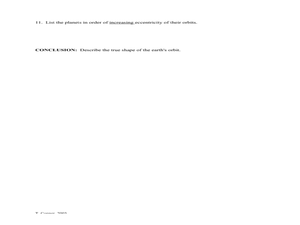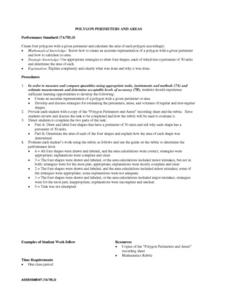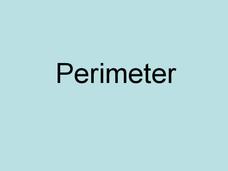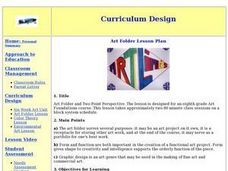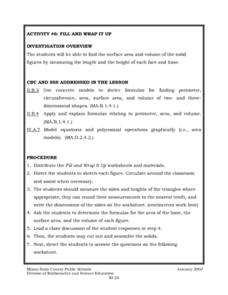Curated OER
Classify Prisms
Middle schoolers classify prisms according to their attributes. In this classifying prisms lesson, students explore different prisms. Middle schoolers generate observations of the attributes and classify the prism correctly.
Curated OER
Calculating Distances in Two and Three Dimensions
Students use the Pythagorean Theorem to solve problems. In this geometry lesson, students solve for the distances by calculating the different parts of the shape of a two and three dimensional shape. They reason by analogy.
Curated OER
Using Concept Maps to Design 3D Spheres
Students create three dimensional shapes using concept maps. In this geometry lesson, students investigate the impact of mental schemas on humans. They collect data on this topic and plot their data on a coordinate plane.
Curated OER
Tetrominoes Cover-Up
Third graders are given square tiles and participate in a demonstration on how to arrange them. Using the tiles, they work with a partner to discover how many two-dimensional tetrominoes they can create. To end the lesson, they must...
Curated OER
Geometry: Plane Figures
In this plane figure activity, students complete 4 multiple choice questions, determining which solid figure can be traced to make a given plane figure. A reference web site is given for additional activities.
Curated OER
Ellipse Lab
Leading the students to draw a representation of ellipses of planets, this handout will help understanding the planet movement around the sun. There are ten questions about the analysis of those orbits and a conclusino specifically...
Concord Consortium
3D Exploration of Bound Antibody and Antigen
Our body manufactures antibodies that are the exact shape for the antigens it encounters. The simulation shows a 3-D model of an antibody and antigen pairing. It allows young scientists to explore the complementary shapes.
Royal Society of Chemistry
Sub-shells
Is your class in a quandary over quantum numbers? Change things up by adding games to the mix! Science scholars discover the shape, number of electrons, and number of orbitals in the s, p, and d sub-shells using an interactive.
EngageNY
Surface Area II
Examine the surface area of composite figures using an exploratory approach. As a continuation of the previous lesson plan of the 29-part series, young scholars develop plans for finding the surface area of composite figures. Examples...
Curated OER
Mental Math Problems
In this sequencing worksheet, learners make a number sequence chart by following the given rule, continue number sequences through seven additional numbers, and continue patterns. Students solve five multiple answer problems.
Curated OER
Children's Museum of Houston - Pre/Post Classroom Activities - Nets
Students make three dimensional shapes with nets. For this nets lesson, students receive nets which they fold to make a three dimensional object. They predict what shape each net will make and verify it after making the net. They use the...
Curated OER
Calculating Perimeter and Area of Polygons
Students discuss strategies for estimating information about various shapes. Once they draw and label four shapes with perimeters of 30 units, they calculate the areas of the figures. To complete the lesson, students offer written...
Curated OER
Perimeter
Have your class practice finding the perimeter of several given shapes. This slide show includes a definition and example of how to find perimeter along with several practice problems for the class to solve.
Curated OER
Match the Letters
Build a foundation of alphabet familiarity using this matching learning exercise. Learners focus on lowercase letters a, o, c, d, g, and q as they match balloons to corresponding children. Each balloon and child has a letter inside,...
Curated OER
Word Search: Solar System
In this solar system word search, students will locate 23 words in a rocket-shaped word search puzzle. A word bank is provided.
Curated OER
Cylinder Volume Lesson Plan
Tenth graders define the formula for cylinders and use it to solve real world problems. In this geometry lesson, pupils differentiate between area, perimeters, 2D shapes, 3D shapes, and volume of prisms, cylinders and spheres. They...
Curated OER
Around the Bend
Young scholars examine the art elements of the Inca "Large Jug." In this visual art lesson, students identify the colors, pattern, and shape of the Inca "Large Jug." Young scholars then draw a design on a flat and curved surface and...
Math Worksheets Land
Partition Circles and Rectangles - Matching Worksheet
What are these familiar shapes divided into? Practice with segmented shapes. Pupils examine five shapes, each broken into two, three, or four equal parts. They connect the shape with one of the five answers: thirds, 1/4, halves,...
Curated OER
Sorting and Classifying
Fifth graders are engaged in sorting and classifying geometric shapes of various colors and sizes. They discuss the properties of these shapes and illustrate a range of classifications using Venn diagrams.
Math Worksheets Land
Partitioning Circles and Rectangles - Matching Worksheet
This geometry idea is simple enough, but you'll need to note the typos in the directions. Learners match quarters and halves on the right to their whole shapes on the left. The shapes on the left are divided to make this concept easier...
Curated OER
Art Folder and Two Point Perspective
Eighth graders examine how to create a 3-D effect on a flat surface and draw in two-point perspective. They view and discuss elements of design, analyze artwork by M.C. Escher and Roy Lichtenstein, and design and create an art folder.
Curated OER
One Revolution for Robot
Learners calculate the revolution and circumference of circles. In this calculus lesson plan, students derive the formulas for their given shape. They use the d=rt to calculate the distance and rate of travel.
Curated OER
Investigation - Mathematical Reasoning: Tables and Chairs
Fourth graders draw pictures and diagrams as they attempt to solve a mathematical problem involving the arrangement of eleven tables shaped like equilateral triangles and the seating of exactly twenty-five people.
Curated OER
Fill and Wrap It Up
Students find the surface area and volume of the solid figures by measuring the length and the height of each face and base. They use concrete models to derive formulas for finding perimeter, circumference, area, surface area, and volume...
Other popular searches
- 3 D Geometric Shapes
- 3 D Shapes
- 2 D Shapes
- Geometry Shapes 3 D Shapes
- 3 D Shapes
- 2 D Shapes
- 3 D Geometric Shapes
- Kindergarten 3 D Shapes
- 3 D and 2 D Shapes
- 3 D Shapes Worksheet
- Cylinder 3 D Shapes
- Free 3 D Geometric Shapes





